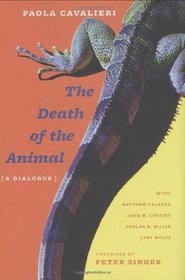Search -
The Death of the Animal: A Dialogue
The Death of the Animal A Dialogue
Author:
While moral perfectionists rank conscious beings according to their cognitive abilities, Paola Cavalieri launches a more inclusive defense of all forms of subjectivity. In concert with Peter Singer, J. M. Coetzee, Harlan B. Miller, and other leading animal studies scholars, she expands our understanding of the nonhuman in such a way that the der... more »
Author:
While moral perfectionists rank conscious beings according to their cognitive abilities, Paola Cavalieri launches a more inclusive defense of all forms of subjectivity. In concert with Peter Singer, J. M. Coetzee, Harlan B. Miller, and other leading animal studies scholars, she expands our understanding of the nonhuman in such a way that the der... more »
ISBN-13: 9780231145527
ISBN-10: 0231145527
Publication Date: 1/20/2009
Pages: 168
Edition: 1
Rating: ?
ISBN-10: 0231145527
Publication Date: 1/20/2009
Pages: 168
Edition: 1
Rating: ?
0 stars, based on 0 rating
Publisher: Columbia University Press
Book Type: Hardcover
Members Wishing: 0
Reviews: Amazon | Write a Review
Book Type: Hardcover
Members Wishing: 0
Reviews: Amazon | Write a Review
Genres:
- Nonfiction >> Philosophy >> Ethics & Morality
- Nonfiction >> Philosophy >> General
- Science & Math >> Nature & Ecology >> Animal Rights




